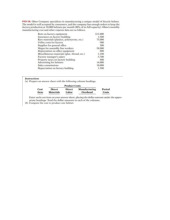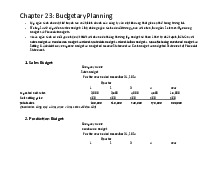




Preview text:
VIETNAM NATIONAL UNIVERSITY - HO CHI MINH CITY
INTERNATIONAL UNIVERSITY SCHOOL OF BUSINESS GROUP ASSIGNMENT
Subject: Managerial Accounting
Lecturer: Vũ Tuấn Anh No. Member’s name Student ID 1
Nguyễn Hải Linh BAFNIU20484 2
Trần Trịnh Minh Trang BAFNIU20446 Table of Contents
1. CASE 1: PARTICIPATIVE VERSUS IMPOSED BUDGETING..............................2
a. Behavioral Implications............................................................................................2
b. Communications' Function......................................................................................3
2. CASE 2: MANAGERIAL PERFORMANCE EVALUATION....................................4
a. The segment information prepared for public reporting purposes are not
appropriate for the evaluation of segment management performance........................4
b. The potential behavioral effects of the segment managers.....................................5
c. More suitable types of financial information.............................................................5
CASE 1: PARTICIPATIVE VERSUS IMPOSED BUDGETING
a. Behaviora l Implications:
Budgeting is very important technique for any organization or establishment.
Setting objectives and benchmarks for an organization or business, then
comparing the outcomes to the standards to find any gaps and realign the
targets is a crucial part of budgeting.
• Behaviora l Implications of Imposed Budgeting : A imposed
budgeting strategy has an authoritative feel to it. Strategic goals are
included into the budget by senior management as part of the top-down
management methodology. The ability to influence decisions is improved.
When incentives are given to employees depending on how well they
perform in comparison to the budget, this tendency is more prominent.
However, since the top management informs the middle and lower
management of the plans, it appears that there is more dictation going
on than conversation. Employees may feel inactive, dull & their
performance was not upto mark.
• Behaviora l Implications of Participative Budgeting : In case of a
participatory budgeting method, the top management is informed of the
perspective from the lower levels. Budgets need not be created using
historical data, instead, estimates that the area managers are more
knowledgeable about might be included as inputs. Budget decisions
would be well-informed thanks to this expertise. However, there is a
chance that the financial process may not give the strategic goals top
priority. This type of budgeting creates a sense of responsibility among
employees. This type of budgeting helps the top management in finding
out the the problems faced by the bottom level employees & also
employees can understand their top level managers in handling various
problems. In participatory budgeting the employees set their goals & try harder to meet them.
Therefore, creating a budget is crucial for the development & efficient
functioning of the business. Managers should understand their role in
budgeting regardless of whether it is enforced or participatory so that it may be
a valuable tool for planning and regulating.
b . Communications' Function
The variations between intelligence flows in these two budgetary approaches. the plans and budget while the middle and lower Imposed Bugeting Participative Budgeting • •
A participatory budget, as its The communication is topdown name suggests, allows for
and hardly qualifies as such in bottom-up dialogue. Here, the
the event of an enforced fiscal management is informed from strategy. a lower level perspective. •
It takes the shape of authority,
with the top management setting
• This strategy takes longer than involves many more people
an authoritative budget since it than the top-down approach,
level management adheres to which only involves senior their
established procedures management.
and works within the allocated budget.
The behavioral connotations associated with the intelligence process
for each of the budgetary approaches Imposed Bugeting
Participative Budgeting
If a budgeted approach is enforced, The employees feel empowered and
there is a good probability that the engaged when they participate in the
employees will feel ignored, budget process. This strategy works best when the area manager has the
disgruntled, and uninspired. At the most reliable information. It raises lowest
levels, the rigid budgets staff morale and motivates them to proposed might
not be properly work harder to fulfill their adhered to. expectations, which promises more efforts for overall progress.
CASE 2: MANAGERIAL PERFORMANCE EVALUATION
a. Why the segment information prepared for public reporting purposes
may not be appropriate for the evaluation of segment management performance ?
Due to the following factors, segment information provided for public reporting
purposes may not be suitable for assessing segment management performance.
• For the purposes of public reporting, an assignment of general costs
established for the benefit of more than one segment must be taken into consideration.
• The allocation of common expenses is frequently arbitrary.
• The segments chosen for use in public reporting could not accurately
reflect the management accountabilities.
• This information is unable to distinguish between a segment that is
badly invested and a manager's performance under challenging circumstances.
b. The possible behavioral impact of Bubba Gump Corporation's segment
managers if their performance is evaluated on the basis of the
information in the annual financial report.
The segment managers of Bubba Gump Corporation may be perplexed if the
information in the annual financial statement is used to evaluate their
performance because they will be held responsible for an income figure that
includes costs that are arbitrarily assigned to general expenses and costs
that are traceable to but uncontrollable. This method of performance
evaluation will not satisfy. Managers will be motivated to search for work
elsewhere by this unhappiness.
c. Severa l types of financial information that would be more appropriate
for Forrest to review when evaluating the performance of segment managers.
Despite employing the segment as required by legislation designed for public
financial reporting, Bubba Gump Corporation should give responsibility
centers that correspond to the manager's real duties.
The coordinative policy, which separates costs by behavior and only allocates
costs to segments if they are controllable by the segment, should be used to
keep all reports. The report should include the contribution margin, the
segment managers' controllable contribution, and the contribution of each
segment following the allocation of shared expenses. THE END




